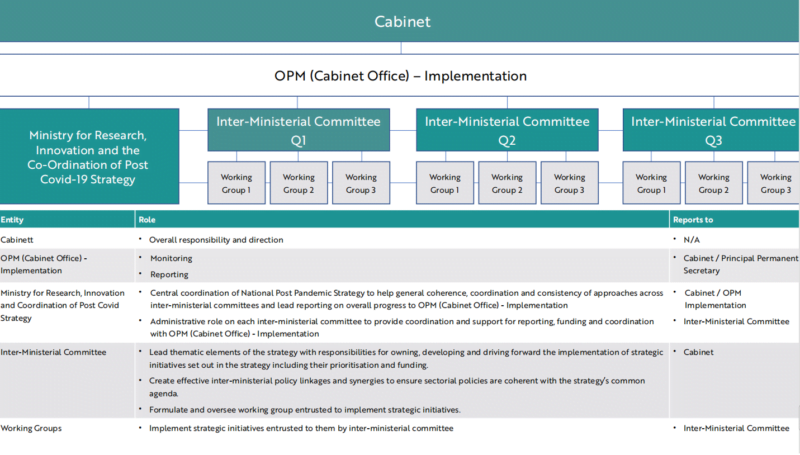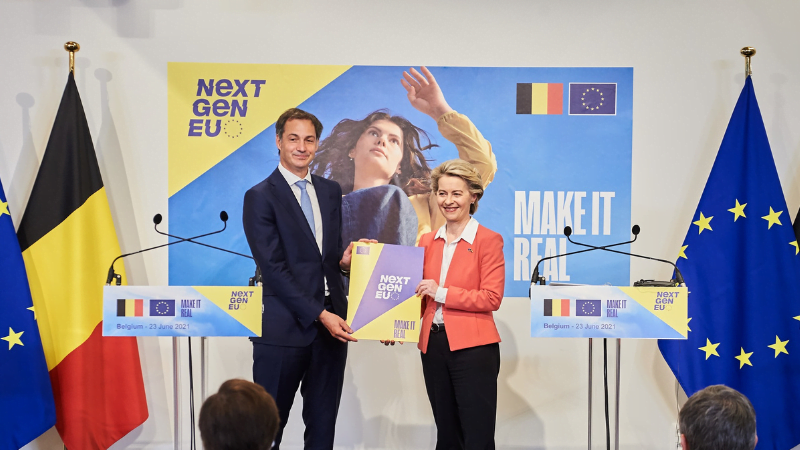Business and industry leaders have said they are disappointed with the government’s lack of consultation over the formulating of Malta’s post-COVID recovery plan, unveiled on Wednesday, and the related application for EU funds to help boost growth in the aftermath of the pandemic.
While Malta’s so-called National Post-Pandemic Strategy was presented this afternoon, stakeholders say they weren’t consulted or invited to participate in the formulation of the application for crucial EU funding for member states seeking to rebuild after COVID, despite the obvious significance to their activities.
Parliamentary secretary for EU funds Stefan Zrinzo Azzopardi did not reply to questions sent by The Shift about Malta’s application for €320 million in EU commission funding to help finance the national post-pandemic strategy.
According to news reports, Malta’s application was submitted to the EU Commission earlier this week after it was reported that Malta was one of the few remaining countries not to have finalised its plan. So far, the application remains shrouded in secrecy.
The separate document presented on Wednesday by post-COVID strategy minister Owen Bonnici outlines 12 main action points which the government promises to work on over the next three years, with the stated aim of improving performance in key sectors such as healthcare, research and innovation and the environment.
However, neither Bonnici nor Zrinzo Azzopardi has explained why key stakeholders claim a lack of consultation on the EU funding application despite the criteria specifically asking for detailed reports of stakeholder feedback and how that feedback was integrated.
There was also no explanation of why the application for the EU’s recovery and resilience plan (RRP) was discussed at Cabinet level rather than in Parliament, or why key stakeholders were essentially handed a fait accompli with both reports.
In other words, the RRP application for €320 million was not even discussed outside of Cabinet, while the local national recovery plan which will, based on references to it within the government document, be taking cash injections from the RRP, was controlled by a body of government-appointed specialists.
The local plan was presented to stakeholders on Wednesday before being presented to the press and then to the public shortly afterwards.
The chamber of commerce described the consultation process for the RRP as “not adequate, particularly given the recovery support that private industry requires at the moment”.
“Continuous stakeholder involvement from the early stages is crucial to ensure that funds are used in the best way possible to actually reach their intended scope,” the CEO of the chamber, Marthese Portelli, stated.
The chamber of commerce stated it will also be keeping an eye out for the publication of Malta’s EU recovery and resilience plan application and “will comment following its publication and internal discussions of the chamber’s council”.
Besides discussing various sectors and demographics within Maltese society, the national post-pandemic strategy pointedly refers to the local recovery plan which the government “is in the process of finalising” and sending to the EU commission.
The EU’s Recovery and Resilience Facility, as it is officially known, is part of the EU’s approved 7-year plan for 2021 – 2027, a budget that adds up to a colossal €2.018 trillion.
The recovery and resilience package makes up €672.5 billion of the overall 7-year plan, which in turn consists of €312.5 billion in grants and €360 billion in loans distributed all throughout the EU’s member states.
While the national recovery plan document states that 80 meetings with “key stakeholders, social partners and government ministries were held” and that “extensive research” was conducted on other countries, along with a month-long public consultation, the strategy is largely directed by government via its appointed figures rather than the stakeholders themselves.

A diagram that explains the entities which will coordinate and promote the points outlined by the national post-pandemic strategy.
The steering committee that came up with the strategy was chaired by Professor Simone Borg. Paul Zahra, a representative of the parliamentary secretariat for EU funds, was also on the committee.
The rest of the committee of “seasoned experts” consisted of representatives from the University of Malta, the Malta Council for Social and Economic Development, the ministry of finance’s economic policy department and the superintendence of public health.
The local strategy document itself, titled ‘national post-pandemic strategy’, appears to be a non-committal national outline with no clear budgeting or set time frames as well as no accountability of the administration’s failures in areas it itself recognises as key priorities for a more sustainable economy.
One example of this can be seen in repeated references to over-development, which it flags as a problem but stops short of pointing towards the causes.
The government has failed to provide adequate enforcement against abusive developments across the country, with planning authority enforcement actions often being appealed and effectively paralysed by developers seeking to finish works before any action is taken.
Referring to the rapid rate at which profit-making opportunities have increased over the last few years, the document argues that this “has also created significant problems in the form of over-development, urban sprawl, increased traffic, higher levels of noise and pollution, and stresses on national infrastructure”.
While the document promises the government will develop further planning regulations, enhance enforcement and the environment and resources authority as well as “the granting of power to the newly established building and construction authority to monitor compliance with laws”, it conveniently fails to point out government’s inaction to date on all three counts.
At no point does the document refer to cases showing the planning authority or the appeals tribunal have repeatedly bent their own laws to favour development in spite of overwhelming public opposition, nor does it refer to how the government has failed to establish a national building code or an authority capable of enforcing one, in spite of promises made in the wake of Miriam Pace’s tragic death in a building collapse.














It’s time for the opposition to track all these funds as most probably most of the funds will be directed to friends of friends with commissions included. Never trust assassins and fraudsters.